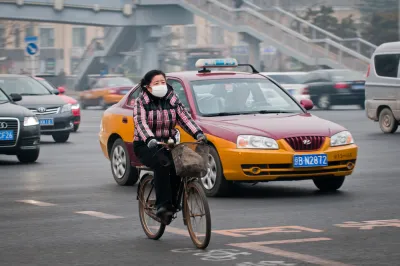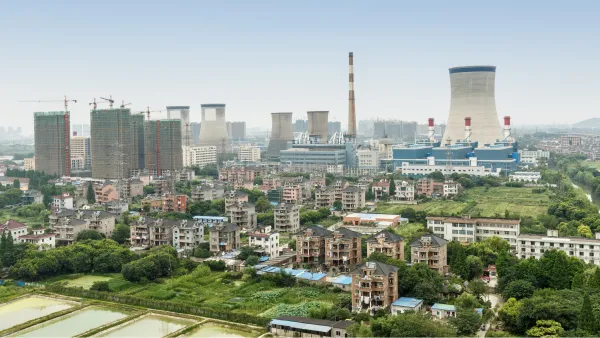Beijing has strayed so far from its roots as a bicycling city that it now claims the title of the world's largest auto market, while only 12 per cent of commuters use bicycles. City planners wants to make it popular again to reduce air pollution.

"Bikes became an integral part of China’s culture after the Communist revolution in 1949," writes Owen Guo, news researcher for The New York Times in Beijing. "Along with a sewing machine and a watch, a bicycle was once considered one of the three must-haves of every Chinese household."
As China has urbanized, families have become more prosperous and many city residents have moved to suburbs many miles from their jobs. The resulting growth in car use combined with lax law enforcement has undermined a half-century tradition of commuting on bikes.
How far and fast China's capital city has strayed from those roots. Consider that in 2000, 38 percent of commuters cycled to work. Guo writes a comprehensive piece that looks at the challenges that planners face to increase cycling.
Beijing "wants to increase the proportion of commuters who use bikes to 18 percent by 2020, according to city transportation officials," writes Guo. But the challenges are formidable.
A study (published in August) by researchers at Peking University in Beijing found that air pollution, safety concerns and a lack of road space were the main reasons people avoided biking to work in the capital.
"The negative perception that bicycle lanes have gradually been taken over by motorized vehicles is one key reason that deters motorized commuters from bicycling," write researchers Ming Yang and John Zacharias, which is confirmed anecdotally by Guo.
One reason for motorists parking in bike lanes is that "(t)he city has designed parking capacities that can accommodate only half of its five million cars, said Li Wei, an engineer at the Beijing Municipal Institute of City Planning and Design.
Outside of the capital city's horrific air pollution, cycling conditions share similarities with the United States. "(T)he city’s transportation policies have long favored cars," stated Wei, which any American cyclist can identify with.
Hat tip: Jennifer Scholtes, Politico Morning Transportation
FULL STORY: A City Choking on Cars Hopes Commuters Will Return to Two Wheels

Analysis: Cybertruck Fatality Rate Far Exceeds That of Ford Pinto
The Tesla Cybertruck was recalled seven times last year.

National Parks Layoffs Will Cause Communities to Lose Billions
Thousands of essential park workers were laid off this week, just before the busy spring break season.

Retro-silient?: America’s First “Eco-burb,” The Woodlands Turns 50
A master-planned community north of Houston offers lessons on green infrastructure and resilient design, but falls short of its founder’s lofty affordability and walkability goals.

Test News Post 1
This is a summary

Analysis: Cybertruck Fatality Rate Far Exceeds That of Ford Pinto
The Tesla Cybertruck was recalled seven times last year.

Test News Headline 46
Test for the image on the front page.
Urban Design for Planners 1: Software Tools
This six-course series explores essential urban design concepts using open source software and equips planners with the tools they need to participate fully in the urban design process.
Planning for Universal Design
Learn the tools for implementing Universal Design in planning regulations.
EMC Planning Group, Inc.
Planetizen
Planetizen
Mpact (formerly Rail~Volution)
Great Falls Development Authority, Inc.
HUDs Office of Policy Development and Research
NYU Wagner Graduate School of Public Service



























